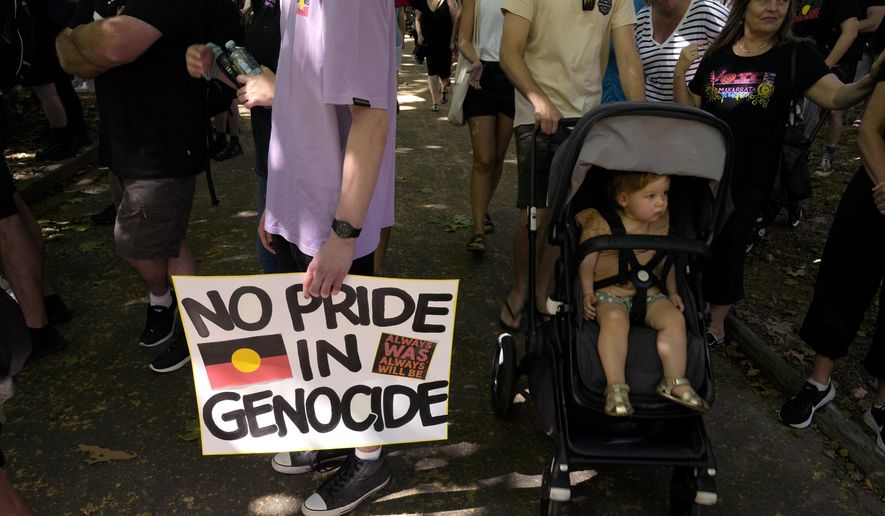Protesters brandished placards reading “No pride in genocide” and “Imagine not paying rent for 235 years” Thursday, proof that this year’s Australia Day celebrations have not put to rest the country’s struggle to come to terms with its troubled past.
Australia Day marks the arrival of British ships on Jan. 26, 1788, in what is now Sydney Harbor, establishing a penal colony and initiating a process that led to eventual statehood. Muted the past two years by the global COVID-19 pandemic, it’s a holiday that is customarily celebrated with family gatherings around barbecues.
On the plus side, today’s peaceful, prosperous Australia would seem to have much to celebrate.
The self-described “Lucky Country” is a stable democracy with many natural resources. Australia was among the Allies that fought against the Axis powers in World War II. In the decades after, it has welcomed almost 5.7 million migrants from a variety of cultures, races and religions.
But as in the U.S., many Aussies don’t buy into the triumphant national narrative or celebrate the event it commemorates.
For them, the country’s legacy includes the colossal damage done to Aboriginal inhabitants, as settlers arrived in their hundreds, then thousands and millions. The colonists hunted and killed the Aborigines, who were also ravaged by disease and alcohol.
Australia shares its conundrum with former British colonies Canada, New Zealand and the United States. How should democracies balance national pride with a legacy of wrongs done to Indigenous peoples?
Australia’s new center-left Prime Minister Anthony Albanese sought to balance his message of celebration in remarks Thursday.
At a ceremony for new citizens, he called Australia “the greatest country in the world” and told his audience, “Welcome home.” In a separate message, he praised Australians’ “instinct for fairness, decency and care and respect for each other.”
On his official website, Mr. Albanese also paid respect “to the traditional owners of the land” in one message, and referenced Aboriginal elders in the other. In yet another, he said Australians should take pride in their history “of over 60,000 years” — adding, “of course, since 1788, we have become a country of migrants as well.”
Sydney’s iconic opera house was lit up in Aboriginal patterns, and an Aboriginal flag flew alongside the national flag over the city.
But these upbeat signals contrasted with the downbeat vibe at protests, held in cities across the nation, which renamed Australia Day as “Invasion Day” and demanded more action to right historical wrongs.
“Nobody’s got the right to celebrate genocide,” Abi George, a protester on the streets in Sydney, told the Reuters news agency.
A campaign to move the date that marks the British arrival is growing, garnering the support of, among others, Hollywood A-lister Chris Hemsworth. But though polls say about a third of Australians agree, there are many, many more who do not.
Pushing back
A backlash to the backlash is in full swing.
The British arrival was “in general friendly and cooperative with exchanges of goodwill on both sides,” argued Russell Kelly, a Brisbane-based historian who rails against “Invasion Day.” He noted that when the British encountered a large Aboriginal war party four months after their arrival, there were no hostilities — meaning there was “no strategic plan of attack to rid the land of ‘invaders.’”
He also fretted that the promotion of “Invasion Day” by the left and by Aboriginal people will spark a counter-reaction from hardcore nationalists.
But Matt Jones, a retired military veteran, and like Mr. Russell, an Australian of European ancestry, argued that Australia Day’s days are numbered.
“This year shows a considerable shift in public sentiment,” Mr. Jones said. “I believe that Australia as a country is worth celebrating, [but] trends would indicate that 26 January is increasingly untenable for the future, despite the support it still receives by many.”
Complicating the debate is that there is no obvious consensus on a different date for the country’s national day, or what landmark should be celebrated. Many suggest that Australia Day ought to be held on May 8, because it echoes the signature Australian vernacular “mate!”
There are other, weightier, proposals in play.
Indigenous peoples, in the landmark 2017 Uluru Statement, wrote that they are “proportionally the most incarcerated people on the planet” and spoke of a “torment of powerlessness.” The statement demanded a special commission to work with the government and “truth-telling about our history.”
Mr. Albanese indicated again Thursday he does not favor changing the Jan. 26 date but has backed holding a national referendum on “The Indigenous Voice to Parliament.” “The Voice” calls for an indigenous committee to advise parliament on indigenous peoples’ issues. It would require a constitutional revision.
But even that move has its critics.
According to Australia’s ABC News, Gary Foley told a protest in Melbourne on Thursday that the proposal would be “like lipstick on a pig. It will not address the deep underlying issues that still pervade Australian society and that primary issue is White Australian racism.”
One American academic, calling related U.S. trends “the cultural legacy of White imperialism,” slammed statements of contrition and inclusion for lack of material substance.
“I feel these statements are patronizing and do the opposite of what they’re supposed to do: ‘We acknowledge these horrible things and we are going to performatively go through the motions, but we are not going to give anything back,’” said Michael Hurt, who teaches cultural theory in South Korea. “That is the bottom line, and that seems to me to be a weird way to get to the truth of history.”
• Andrew Salmon can be reached at asalmon@washingtontimes.com.




Please read our comment policy before commenting.